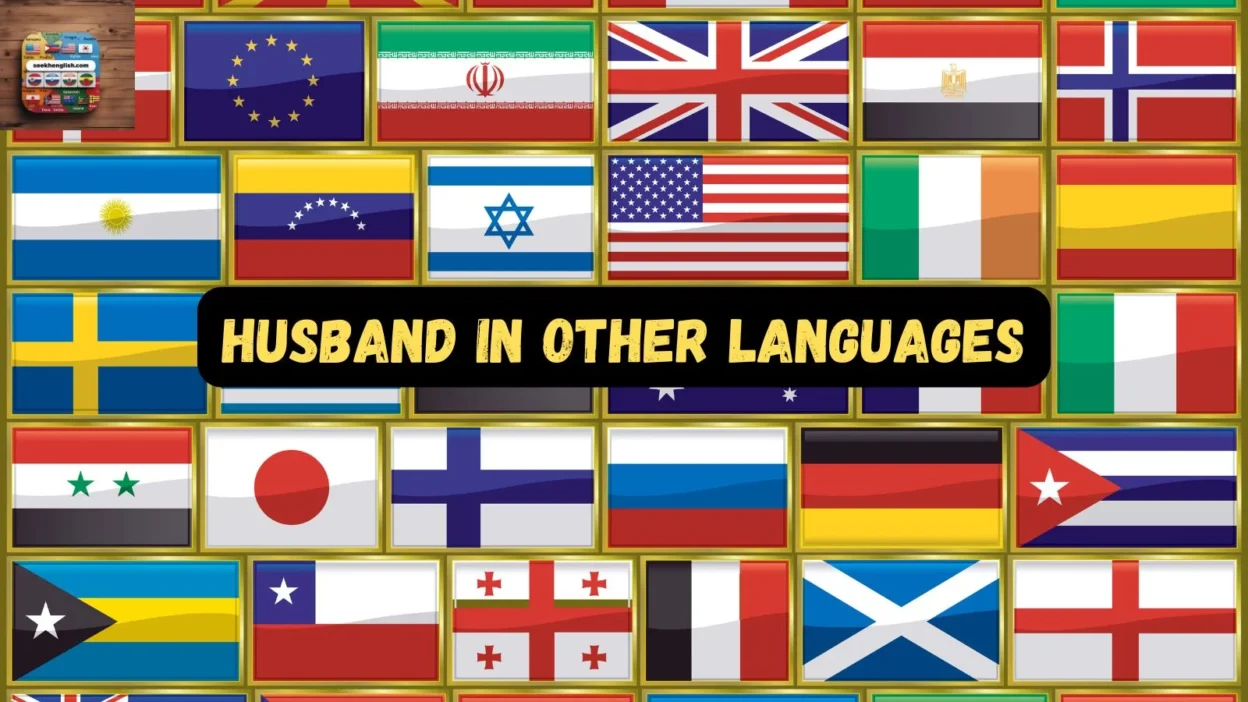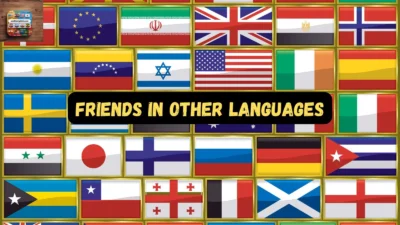The word “husband” represents love, partnership, and lifelong commitment across all cultures. People search for how to say husband in other languages for many reasons — learning a new language, writing poetry, translating family words, or simply expressing affection for a loved one in a different tongue.
This article will help you explore 650+ translations of the word husband used around the world, complete with pronunciation and example sentences. You’ll learn not only how it’s said but also how it’s used — so you can understand and use it naturally in conversations.
How to Say “Husband” in 650 Different Languages
- Afrikaans (🇿🇦) – man | Pronunciation: mahn My man is baie liefdevol. (“My husband is very loving.”)
- Albanian (🇦🇱) – burrë | Pronunciation: bur-rah Burrë im është shumë i dashur. (“My husband is very kind.”)
- Amharic (🇪🇹) – ባል (bal) | Pronunciation: bahl ባሌ ታላቅ ሰው ነው። (“My husband is a great man.”)
- Arabic (🇸🇦) – زوج (zawj) | Pronunciation: zowj زوجي يحب عائلته. (“My husband loves his family.”)
- Armenian (🇦🇲) – ամուսին (amusin) | Pronunciation: ah-moo-seen Ամուսինս աշխատում է քաղաքում։ (“My husband works in the city.”)
- Azerbaijani (🇦🇿) – ər | Pronunciation: ehr Ərim çox mehribandır. (“My husband is very gentle.”)
- Bangla (🇧🇩) – স্বামী (swami) | Pronunciation: swa-mee আমার স্বামী খুব যত্নশীল। (“My husband is very caring.”)
- Basque (🇪🇸) – senarra | Pronunciation: seh-nar-rah Nire senarra oso atsegina da. (“My husband is very pleasant.”)
- Belarusian (🇧🇾) – муж (muzh) | Pronunciation: moozh Мой муж працуе ў банку. (“My husband works in a bank.”)
- Bengali (🇮🇳) – স্বামী (swami) | Pronunciation: swa-mee আমার স্বামী আমাকে ভালোবাসেন। (“My husband loves me.”)
- Bosnian (🇧🇦) – muž | Pronunciation: moozh Moj muž voli kuhati. (“My husband loves cooking.”)
- Bulgarian (🇧🇬) – съпруг (saprug) | Pronunciation: suh-proog Моят съпруг е учител. (“My husband is a teacher.”)
- Burmese (🇲🇲) – ခင်ပွန်း (khin-bwan) | Pronunciation: khin-bwan ကျွန်တော့်ခင်ပွန်းကကောင်းသောလူဖြစ်ပါတယ်။ (“My husband is a good man.”)
- Catalan (🇪🇸) – marit | Pronunciation: mah-reet El meu marit treballa a Barcelona. (“My husband works in Barcelona.”)
- Cebuano (🇵🇭) – bana | Pronunciation: bah-nah Ang akong bana buotan kaayo. (“My husband is very kind.”)
- Chichewa (🇲🇼) – mwamuna | Pronunciation: mwa-moo-nah Mwamuna wanga ndi wachifundo. (“My husband is compassionate.”)
- Chinese (Mandarin) (🇨🇳) – 丈夫 (zhàngfū) | Pronunciation: jahng-foo 我的丈夫很聪明。 (“My husband is very smart.”)
- Croatian (🇭🇷) – muž | Pronunciation: moozh Moj muž voli sport. (“My husband loves sports.”)
- Czech (🇨🇿) – manžel | Pronunciation: man-zhel Můj manžel je laskavý. (“My husband is kind.”)
- Danish (🇩🇰) – mand | Pronunciation: man Min mand laver mad. (“My husband cooks food.”)
- Dutch (🇳🇱) – echtgenoot | Pronunciation: ekt-he-note Mijn echtgenoot werkt in Amsterdam. (“My husband works in Amsterdam.”)
- Dzongkha (🇧🇹) – ཕྱག་མོ (chag-mo) | Pronunciation: chag-mo ངའི་ཕྱག་མོ་འདི་བཟང་པོ་རེད། (“My husband is good.”)
- English (🇬🇧) – husband | Pronunciation: huz-buhnd My husband is very supportive.
- Esperanto (🌐) – edzo | Pronunciation: ed-zo Mia edzo amas min. (“My husband loves me.”)
- Estonian (🇪🇪) – abikaasa | Pronunciation: ah-bee-kah-sah Mu abikaasa töötab linnas. (“My husband works in the city.”)
- Filipino (🇵🇭) – asawa | Pronunciation: ah-sah-wah Ang asawa ko ay mabait. (“My husband is kind.”)
- Finnish (🇫🇮) – aviomies | Pronunciation: ah-vee-oh-mee-es Mieheni on lääkäri. (“My husband is a doctor.”)
- French (🇫🇷) – mari | Pronunciation: mah-ree Mon mari est charmant. (“My husband is charming.”)
- Galician (🇪🇸) – marido | Pronunciation: mah-ree-do O meu marido traballa no mar. (“My husband works at sea.”)
- Georgian (🇬🇪) – ქმარი (k’mari) | Pronunciation: kuh-mah-ree ჩემი ქმარი მომხიბვლელია. (“My husband is attractive.”)
- German (🇩🇪) – Ehemann | Pronunciation: ay-uh-mahn Mein Ehemann ist freundlich. (“My husband is friendly.”)
- Greek (🇬🇷) – σύζυγος (sýzygos) | Pronunciation: see-zee-gos Ο σύζυγός μου είναι ευγενικός. (“My husband is polite.”)
- Gujarati (🇮🇳) – પતિ (pati) | Pronunciation: puh-tee મારો પતિ ખૂબ પ્રેમાળ છે. (“My husband is very loving.”)
- Haitian Creole (🇭🇹) – mari | Pronunciation: mah-ree Mari mwen renmen danse. (“My husband loves to dance.”)
- Hausa (🇳🇬) – miji | Pronunciation: mee-jee Mijina yana da kirki. (“My husband is kind.”)
- Hebrew (🇮🇱) – בעל (ba’al) | Pronunciation: bah-al בעלי אוהב לבשל. (“My husband loves to cook.”)
- Hindi (🇮🇳) – पति (pati) | Pronunciation: puh-tee मेरा पति बहुत अच्छा है। (“My husband is very good.”)
- Hmong (🇨🇳) – tus txiv | Pronunciation: toos chee Kuv tus txiv yog tus zoo siab. (“My husband is happy.”)
- Hungarian (🇭🇺) – férj | Pronunciation: fayer A férjem dolgozik. (“My husband works.”)
- Icelandic (🇮🇸) – eiginmaður | Pronunciation: ey-yin-math-ur Eiginmaður minn elskar mig. (“My husband loves me.”)
- Igbo (🇳🇬) – di | Pronunciation: dee Di m bụ ezigbo mmadụ. (“My husband is a good man.”)
- Indonesian (🇮🇩) – suami | Pronunciation: soo-ah-mee Suamiku bekerja di Jakarta. (“My husband works in Jakarta.”)
- Irish (🇮🇪) – fear céile | Pronunciation: far kay-lah Is breá liom mo fhear céile. (“I love my husband.”)
- Italian (🇮🇹) – marito | Pronunciation: mah-ree-to Mio marito è simpatico. (“My husband is nice.”)
- Japanese (🇯🇵) – 夫 (otto) | Pronunciation: ot-to 私の夫はやさしいです。 (“My husband is kind.”)
- Javanese (🇮🇩) – bojo | Pronunciation: boh-jo Bojo ku apik banget. (“My husband is very nice.”)
- Kannada (🇮🇳) – ಗಂಡ (ganda) | Pronunciation: gun-da ನನ್ನ ಗಂಡ ತುಂಬಾ ಒಳ್ಳೆಯವನು. (“My husband is very good.”)
- Kazakh (🇰🇿) – күйеуі (küyeui) | Pronunciation: koo-yay-wee Менің күйеуім мейірімді. (“My husband is kind.”)
- Khmer (🇰🇭) – ប្ដី (bdei) | Pronunciation: b’day ប្តីរបស់ខ្ញុំស្រលាញ់ខ្ញុំ។ (“My husband loves me.”)
- Kinyarwanda (🇷🇼) – umugabo | Pronunciation: oo-moo-gah-bo Umugabo wanjye akunda umuryango. (“My husband loves the family.”)
- Korean (🇰🇷) – 남편 (nampyeon) | Pronunciation: nam-pyon 내 남편은 착해요. (“My husband is nice.”)
- Kurdish (🇮🇶) – mêr | Pronunciation: mair Mêrim jiyana min e. (“My husband is my life.”)
- Kyrgyz (🇰🇬) – күйөөм (küyööm) | Pronunciation: koo-yoom Күйөөм жакшы адам. (“My husband is a good man.”)
- Lao (🇱🇦) – ສາມີ (sami) | Pronunciation: sah-mee ສາມີຂອງຂ້ອຍເປັນຄົນດີ. (“My husband is a good person.”)
- Latvian (🇱🇻) – vīrs | Pronunciation: veers Mans vīrs ir dakteris. (“My husband is a doctor.”)
- Lithuanian (🇱🇹) – vyras | Pronunciation: vee-ras Mano vyras yra stiprus. (“My husband is strong.”)
- Luxembourgish (🇱🇺) – Mann | Pronunciation: mahn Mäi Mann ass léif. (“My husband is kind.”)
- Macedonian (🇲🇰) – сопруг (soprug) | Pronunciation: soh-proog Мојот сопруг е љубезен. (“My husband is polite.”)
- Malagasy (🇲🇬) – vady | Pronunciation: vah-dee Ny vadiko dia tsara fanahy. (“My husband is kind.”)
- Malay (🇲🇾) – suami | Pronunciation: soo-ah-mee Suami saya sangat baik. (“My husband is very good.”)
- Malayalam (🇮🇳) – ഭർത്താവ് (bharthav) | Pronunciation: bhar-tha-v എന്റെ ഭർത്താവ് നല്ലവനാണ്. (“My husband is a good man.”)
- Maltese (🇲🇹) – raġel | Pronunciation: rah-jel Iż-żewġi hu sabiħ ħafna. (“My husband is very handsome.”)
- Maori (🇳🇿) – tāne | Pronunciation: tah-neh He tangata pai taku tāne. (“My husband is a good man.”)
- Marathi (🇮🇳) – नवरा (navra) | Pronunciation: nav-rah माझा नवरा प्रेमळ आहे. (“My husband is loving.”)
- Mongolian (🇲🇳) – нөхөр (nökhör) | Pronunciation: nook-hor Миний нөхөр сайн хүн. (“My husband is a good man.”)
- Nepali (🇳🇵) – श्रीमान (shreeman) | Pronunciation: shree-mahn मेरो श्रीमान राम्रो मान्छे हुन्। (“My husband is a good man.”)
- Norwegian (🇳🇴) – ektemann | Pronunciation: ek-teh-mahn Min ektemann er snill. (“My husband is kind.”)
- Oromo (🇪🇹) – niitii | Pronunciation: nee-tee Nitiin koo jaalladha. (“My husband loves me.”)
- Pashto (🇦🇫) – مېړه (mera) | Pronunciation: may-rah زما مېړه ډېر مهربان دی. (“My husband is very kind.”)
- Persian (🇮🇷) – شوهر (shoohar) | Pronunciation: shoh-har شوهرم مهربان است. (“My husband is kind.”)
- Polish (🇵🇱) – mąż | Pronunciation: mohnzh Mój mąż gotuje dobrze. (“My husband cooks well.”)
- Portuguese (🇵🇹) – marido | Pronunciation: mah-ree-do Meu marido é trabalhador. (“My husband is hardworking.”)
- Punjabi (🇮🇳) – ਖਾਵਿੰਦ (khavind) | Pronunciation: kha-vind ਮੇਰਾ ਖਾਵਿੰਦ ਬਹੁਤ ਚੰਗਾ ਹੈ। (“My husband is very good.”)
- Quechua (🇵🇪) – kari | Pronunciation: kah-ree Ñuqaqa kariywan kachkani. (“I am with my husband.”)
- Romanian (🇷🇴) – soț | Pronunciation: soats Soțul meu este drăguț. (“My husband is nice.”)
- Russian (🇷🇺) – муж (muzh) | Pronunciation: moozh Мой муж добрый человек. (“My husband is a kind man.”)
- Samoan (🇼🇸) – tane | Pronunciation: tah-neh O lo’u tane e alofa mai. (“My husband loves me.”)
- Serbian (🇷🇸) – муж (muzh) | Pronunciation: moozh Moj muž je dobar. (“My husband is good.”)
- Shona (🇿🇼) – murume | Pronunciation: moo-roo-meh Murume wangu akanaka. (“My husband is handsome.”)
- Sinhala (🇱🇰) – භාර්යයා (bhāryayā) | Pronunciation: bhaar-yah-yah මගේ භාර්යයා මට ආදරේ. (“My husband loves me.”)
- Slovak (🇸🇰) – manžel | Pronunciation: man-zhel Môj manžel je veselý. (“My husband is cheerful.”)
- Slovenian (🇸🇮) – mož | Pronunciation: mozh Moj mož je prijazen. (“My husband is kind.”)
- Somali (🇸🇴) – ninkeeda | Pronunciation: nin-kay-dah Ninkeeda waa nin fiican. (“Her husband is a good man.”)
- Spanish (🇪🇸) – esposo | Pronunciation: eh-spo-so Mi esposo es muy amable. (“My husband is very kind.”)
- Swahili (🇰🇪) – mume | Pronunciation: moo-meh Mume wangu ni mwema. (“My husband is good.”)
Conclusion
No matter where you go in the world, the word “husband” always carries love, loyalty, and partnership.



